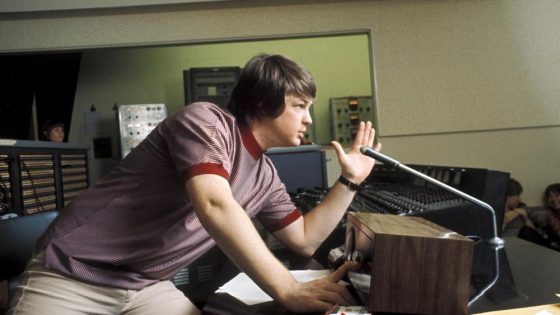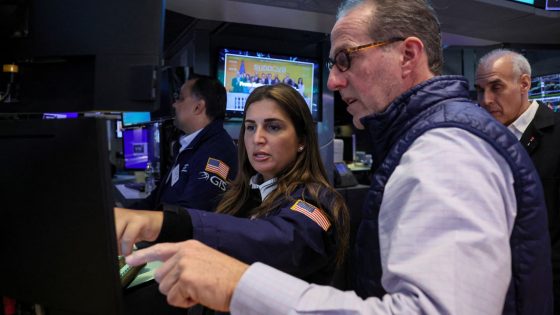When you sit down to watch a documentary about the Beach Boys, you know what you want: to be immersed in the California dreamin’ of the group’s early surfin’-hit days, in the jaunty beauty of songs like “I Get Around” and “Help Me Rhonda,” and in the story of how Brian Wilson began to figure out a way to turn pop songs into miniature symphonies. You want to be immersed in the recording of “Pet Sounds,” in the Beach Boys’ rivalry with the Beatles, in the derailed masterpiece that was “Smile,” and in how Brian’s mental and emotional problems began to tear himself and the group apart. You want to know how the other Beach Boys, caught in the wilderness, found a way to put the group back together, though it’s almost like they became a different group. You want to see the Beach Boys’ saga told in all its sublimity and fragility, from L.A. to “Holland,” from Van Dyke Parks to Manson, from “God Only Knows” to “Kokomo.”
“The Beach Boys,” co-directed by Frank Marshall (who made the 2020 music-doc milestone “The Bee Gees: How Can You Mend a Broken Heart”) and Thom Zimny (who’s directed about a thousand Springsteen videos), accomplishes all of that nicely. I wondered how, exactly, the movie was going to pack the Beach Boys’ vast career into an hour and 53 minutes. But in its unabashedly conventional and fan-friendly way, it brings this off with a tasteful clarity and showmanship. In moment after moment, it gets the Beach Boys.
There are fantastic archival photographs, unseen until now, that give us an intimate glimpse of who the Beach Boys were as individuals (the inner sweetness of the wild child Dennis Wilson, the inner toughness of the hypersensitive Brian). And though so much of their story is familiar that it’s now practically mythology, Marshall and Zimny don’t let themselves get steamrolled by that. They’ve crafted “The Beach Boys” with open eyes, as if there’d never been another film about them (even though there have numerous documentaries as well as the transporting biopic “Love & Mercy”). The result is a movie that a young person who knows nothing of the Beach Boys might find enthralling, and that an ultrafan like myself can still find immensely satisfying, because the film has an inquiring temperament. It coasts along on the telling detail, the anecdote juste, the insight you haven’t heard before.
I never knew, for instance, that Brian, as a teenager, was so obsessed with the Four Freshman that he sat down at the piano to nail down the precise arrangement of the dizzying jazz-meets-big-band harmonies of 20 of the group’s songs, a process that he says “was my entire harmonic education.” I knew that “Pet Sounds,” one of the greatest albums ever made, was a heartbreaking commercial failure, but I didn’t know that Capitol Records was so unenthusiastic about the album that they refused to put any promotional muscle behind it. (If the company had believed in it more, who knows what would have happened? Music history might have been different.)
I didn’t know that the Beach Boys were set to headline Saturday night of the Monterey Pop Festival but dropped out, all but stamping themselves as relics in the new age of rock. I didn’t know that Murry Wilson, the Wilson brothers’ father, Svengali manager, and all-around micro-critical and doting/abusive presence, decided to cash in by selling the Beach Boys’ song catalog…for $700,000. (Today it would easily be worth half a billion.) I didn’t register, in the midst of the Beach Boys’ catchy but lackadaisical ’70s albums, what a paradigm-shifting phenomenon the 1974 greatest-hits double album “Endless Summer” was. I remember when it came out, but the documentary shows you that it was, in effect, the original jukebox musical, an album that reconfigured the Beach Boys’ majesty for a new era.
For all that, the best thing about “The Beach Boys” is that it actually takes in the group through a sharp and sophisticated critical lens. I’m more than capable of enjoying a pop-music documentary that’s a little too starry-eyed for its own good, like “Billie Eilish: The World’s a Little Blurry” or “Coldplay: A Head Full of Dreams” or “ZZ Top: That Little Ol’ Band from Texas” or “Pink: All I Know So Far” or “The Greatest Night in Pop.” But I’m also on record as complaining that too many of these movies now leave out any critical perspective — and by that I don’t just mean recognizing when an artist fails. I mean filling in, with passionate and penetrating commentary, what it is that makes them great.
“The Beach Boys” has memorable critical voices, like Don Was, the record producer who 30 years ago directed a fine documentary about Brian Wilson’s music (“I Just Wasn’t Made for These Times”), or Josh Kun, the cultural historian who wonderfully articulates the rising and falling tides of the Beach Boys’ discography. The movie goes deep into the sound and meaning of their harmony: the way they began to sing together as kids, their voices fusing with a genetic unity (it was the three Wilson brothers, their cousin Mike Love, along with their friend Al Jardine). Love and Jardine are interviewed extensively in the film (Brian shows up, but is mostly represented by older interview clips), and as Jardine recalls it, “We were like notes on a keyboard.” That sounds like a cliché, but it’s no exaggeration. They all sang as one.
The musician Lindsey Buckingham crystalizes the special symbiosis that existed between the Beach Boys and the Beatles. The two groups are usually portrayed as trying to top one another, but Buckingham notes that they were actually united in a larger quest to redefine pop music. Brian’s original deity was Phil Spector, whose direct influence you can hear in “Don’t Worry Baby,” but it was “Rubber Soul” that changed the game.
Brian heard it as a concept album, unified by sound and theme. He knew then that that’s where he wanted to go. There’s a good story about how Bruce Johnston, who by 1966 had joined the group, was trying in an underfunded way to get the word out about “Pet Sounds” in England. Derek Taylor, who’d been a publicist for the Beatles and was now doing that job for the Beach Boys (he was the one who came up with the “Brian is a genius” meme), invited Johnston up to a hotel suite, where John Lennon and Paul McCartney were waiting for him, “dressed in Edwardian suits,” all so that they could hear “Pet Sounds.” They listened to it several times and went into the studio to record “Sgt. Pepper.”
“The Beach Boys” captures the glories of Brian working with the Wrecking Crew on “Pet Sounds,” the way that “Smile” grew beyond him (the movie should have mentioned that the completed version of “Smile” released in 2004 was a transcendent vindication of Brian’s vision), and the teasing hit-or-miss quality of the albums they made after that. If you listen to some of the best songs on those albums, like “Feel Flows” and “Forever,” they show you how the other Beach Boys had learned to compose in the style of Brian. Yet no one could orchestrate a song in three astral dimensions the way he could.
Even Brian, after a while, couldn’t do it anymore. If you listen to a song like “Darlin’,” which closes out the movie (we see the Beach Boys performing it in front of 400,000 people in Washington, D.C., on July 4, 1980), it’s got the Brian magic, but the magic has been brought down to earth. It no longer lifts you up into the stratosphere. By the late ’70s, the Beach Boys had become the first pop superstars of nostalgia. They surfed their own legend. Then again, when talking about the Beach Boys, one should probably be suspicious of a word like nostalgia, when what we really mean is timeless.
Source Agencies



